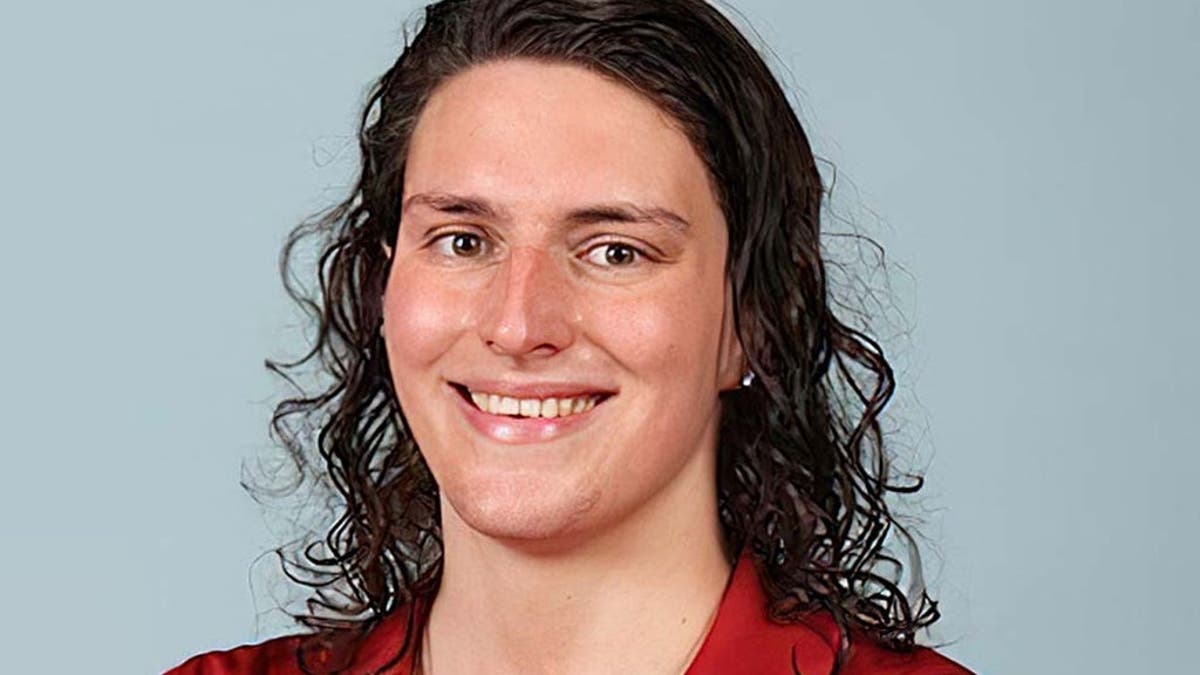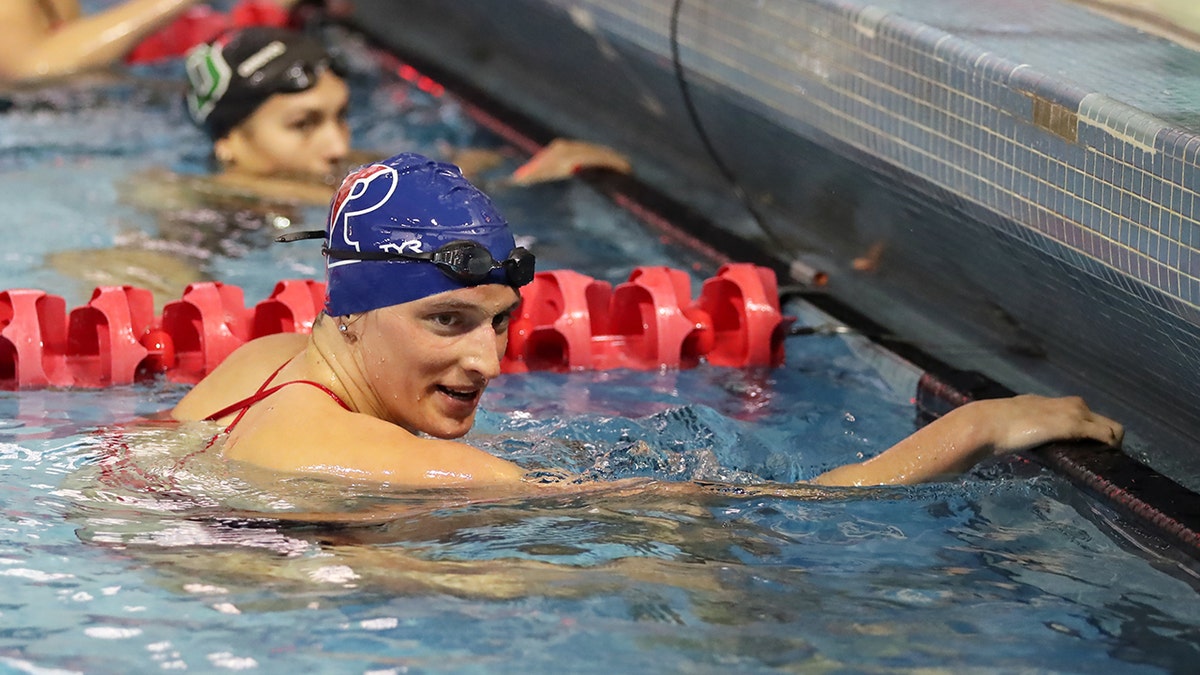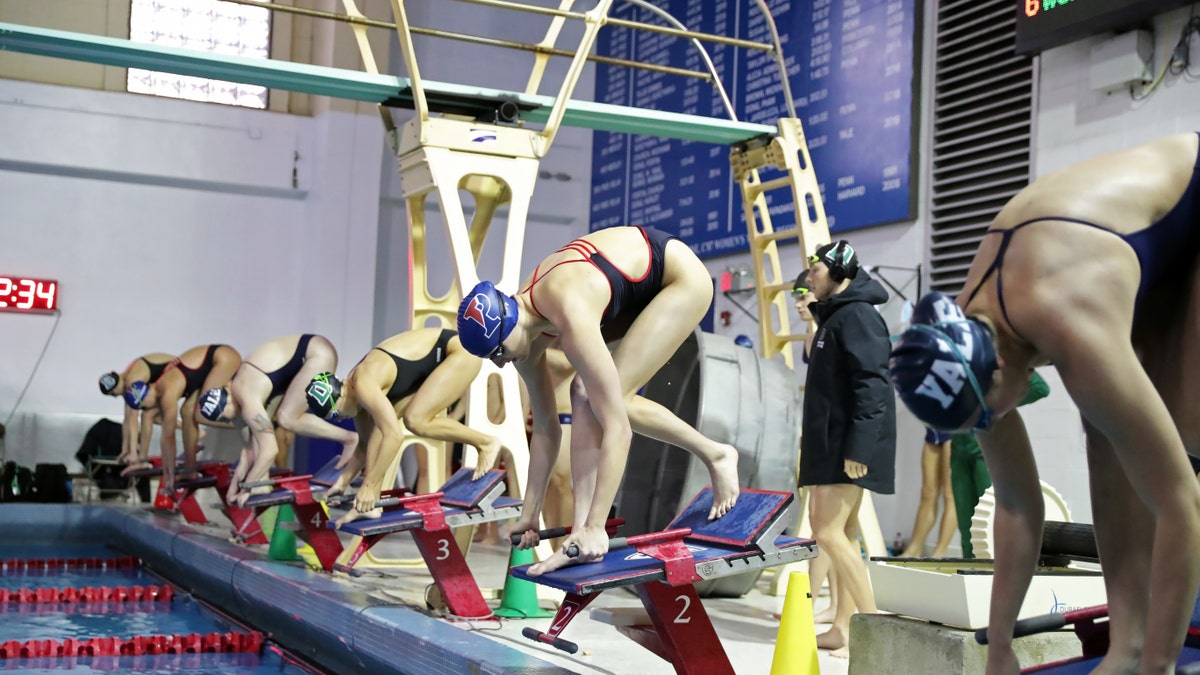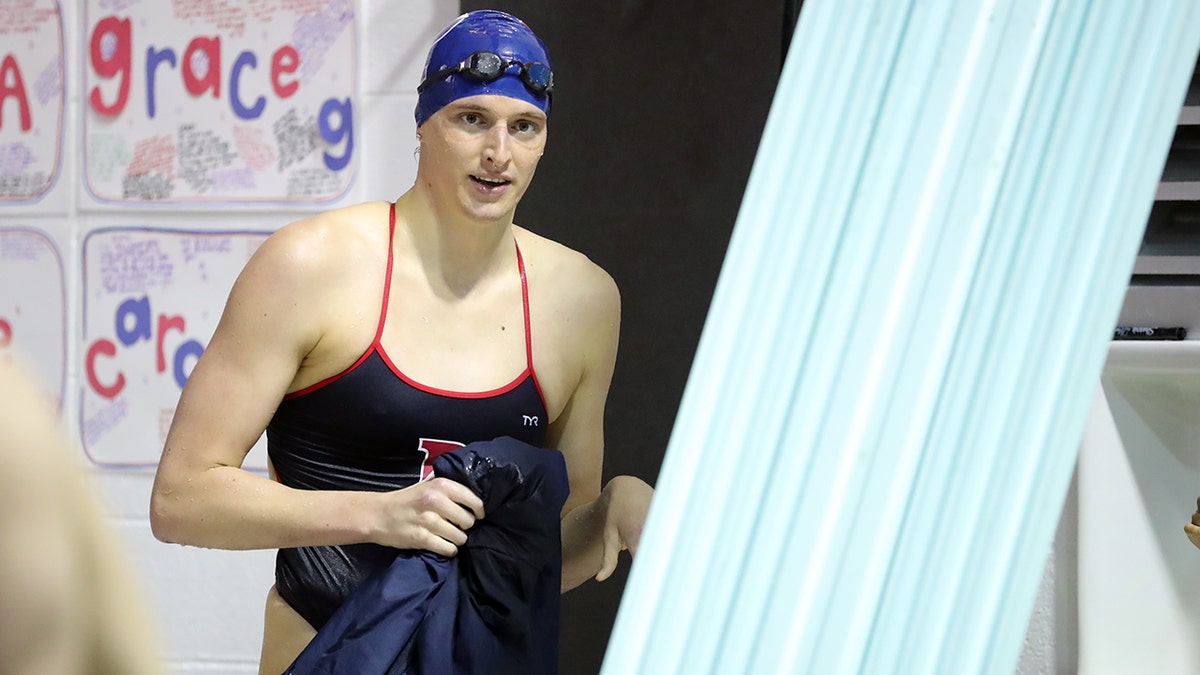Caitlyn Jenner reacts to new NCAA transgender policy: 'Woke world gone wild'
Former Olympian tells 'America Reports' the NCAA only 'kicked the can down the road' with its new policy.
The NCAA’s updated policy on transgender participation threw into question whether Penn swimmer Lia Thomas will be able to race come the winter championships in March.
The NCAA announced late Wednesday its policy for transgender participation will be determined on a sport-by-sport basis. If there is no national governing body for the sport, then the NCAA sport will follow the International Olympic Committee’s (IOC) policy.
The NCAA said the policy would start with the winter championships. The NCAA Division I Women’s Swimming & Diving Championships are set for March 16-19 at the McAuley Aquatic Center in Atlanta.
"Based on the new NCAA policy put out on Wednesday, there is nothing that would preclude Lia from racing in March at the NCAA Championships. There is a framework, some guidance, but nothing that anybody would recognize as a line-in-the-sand threshold," Braden Keith, the co-founder and editor-in-chief of SwimSwam, told Fox News on Thursday.
CLICK HERE FOR MORE SPORTS COVERAGE ON FOXNEWS.COM

Lia Thomas swims for Penn. (Penn Athletics)
"The internal pressure within the sport in the last 24 hours has ramped up on USA Swimming and FINA to make a decision, to come up with a rule or a threshold, and it's left them in kind of a tough spot - they've had this responsibility, the duty to decide what the NCAA rule is, thrust upon them, when I'm sure they were hoping to be able to kick the can down the road a little while longer."
John Lohn, the editor-in-chief of Swimming World Magazine, wrote Thursday the NCAA essentially passed the buck when it came to the decision and failed to give a "clear-cut ruling" on the matter.
"The NCAA Championships are a little less than two months away and, based on the statement released by the NCAA, Thomas might be allowed to compete. Or, she might not. The situation is that up in the air. Whether or not she will race in Atlanta, though, is not the issue here. The focus is that the NCAA had the opportunity to deliver a clear-cut ruling on Wednesday," Lohn wrote. "It could have relied on scientific research and levied a decision on transgender inclusion, and what requirements needed to be met. And if it wasn’t ready to produce a final call, it could have slightly delayed that decision."
The College Swimming & Diving Coaches Association of America also slammed the ruling and called on the NCAA’s Competition Oversight Committee to expand participation by one spot.
NCAA TRANSGENDER PARTICIPATION POLICY 'IS A COLOSSAL ACT OF COWARDICE,' WOMEN'S GROUPS SAY
"The College Swimming & Diving Coaches Association of America (CSCAA) stands with the Ivy League, the University of Pennsylvania, and Penn Athletics in support of Lia Thomas’ right to compete. We further condemn the hatred that has been directed at Ms. Thomas and feel it has no place in the sport of swimming and diving," the organization wrote.
"Yesterday’s Board of Governors’ decision is not a solution. The NCAA’s previous policy on transgender participation, while pioneering, was outdated and yesterday’s decision is a missed opportunity to lead this important discussion. With a billion-dollar budget, designated Sport Science Institute, and subject-matter experts, the NCAA can lead in a way no other National Governing Body (NGB) can. We call on the NCAA to engage with its members, community leaders, medical and mental health professionals, and NGB’s to craft a solution that embraces inclusivity while also ensuring a competitive playing field.

Lia Thomas of the Pennsylvania Quakers smiles after winning the 200-yard freestyle event during a tri-meet against the Yale Bulldogs and the Dartmouth Big Green at Sheerr Pool on the campus of the University of Pennsylvania on Jan. 8, 2022, in Philadelphia, Pennsylvania. (Hunter Martin/Getty Images)
"While there is a desire for swift discussion and resolutions, a thorough, thoughtful, and scientific discussion about the balance of inclusion and fairness will take time. Because of this situation, we call upon the NCAA Division I Competition Oversight Committee to expand this year’s championship participation cap by one spot. This would allow for both Ms. Thomas and the other cisgender women athletes who have earned the right to compete at the NCAA Championships to participate in this year’s event."
PENN, IVY LEAGUE VOW SUPPORT FOR TRANSGENDER ATHLETES FOLLOWING NCAA'S POLICY UPDATE
The updated policy for the NCAA says that, by March, "Transgender student-athletes will need to document sport-specific testosterone levels beginning four weeks before their sport's championship selections. Starting with the 2022-23 academic year, transgender student-athletes will need documented levels at the beginning of their season and a second documentation six months after the first. They will also need documented testosterone levels four weeks before championship selections. Full implementation would begin with the 2023-24 academic year."
There is a framework, some guidance, but nothing that anybody would recognize as a line-in-the-sand threshold.
USA Swimming uses an eligibility review panel to make a decision on transgender athletes’ eligibility. Elite swimmers would be up to FINA and IOC policies.
USA Swimming released a statement on Thursday night.
"USA Swimming firmly believes in inclusivity and the opportunity for all athletes to experience the sport of swimming in a manner that is consistent with their gender identity and expression. We also strongly believe in competitive equity, and, like many, are doing our best to learn and educate ourselves on the appropriate balance in this space," the organization said.
"In 2018, we established athlete inclusion procedures, which included both a process by which an athlete could change their competition category consistent with their gender identity and criteria for athletes qualifying for or competing in elite-level competitions (including those competition time qualifications such as Juniors, Nationals and U.S. Open), which adhered to previous International Olympic Committee guidelines. This policy also importantly provides for individual athlete consideration.

Lia Thomas of the Pennsylvania Quakers gets set to compete in a freestyle event during a tri-meet against the Yale Bulldogs and the Dartmouth Big Green at Sheerr Pool on the campus of the University of Pennsylvania on Jan. 8, 2022, in Philadelphia, Pennsylvania. (Hunter Martin/Getty Images)
"The non-elite athlete inclusion procedures remain unchanged. Following broad transgender policy changes in Nov. 2021, the IOC now requires International Federations to create their own sport-specific eligibility requirements, and so we have been proactively working with FINA for several months to help shape and support their policy development efforts. We believe they will release a new policy shortly, which we will adopt for elite-level competitions.
"USA Swimming is a member-driven organization governed by a 15-member Board of Directors, which oversees more than 360,000 members–including coaches, volunteers and over 325,000 athletes from age-group level to the Olympic Team. These individuals and 2,800 member clubs participate through a network of 59 Local Swimming Committees (LSCs) in four geographic Zones across the U.S. With the NCAA now deferring to USA Swimming for eligibility determinations, we welcome and look forward to American NCAA athletes and coaches joining our membership in order to be eligible to be governed by our policy and its provisions and benefits."
The IOC updated its transgender participation policy in November 2021, refraining from the focus on testosterone levels to determine eligibility, according to The Washington Post. The IOC urged the governing bodies of each individual sport to create the rules while offering assistance.
"Every athlete has the right to practice sport without discrimination and in a way that respects their health, safety and dignity," the updated rules stated. "At the same time the credibility of competitive sport — and particularly high-level sporting competitions — relies on a level playing field where no athlete has an unfair or disproportionate advantage over the rest."
Richard Budgett, the IOC’s medical and scientific director, said at the time it was important to look at broader terms rather than just testosterone levels.

Lia Thomas of the Pennsylvania Quakers after competing in a freestyle event during a tri-meet against the Yale Bulldogs and the Dartmouth Big Green at Sheerr Pool on the campus of the University of Pennsylvania on Jan. 8, 2022, in Philadelphia, Pennsylvania (Hunter Martin/Getty Images)
NCAA CHANGES TRANSGENDER ATHLETE PARTICIPATION POLICY AMID CALLS FOR REEVALUATION
"It’s important we broaden the evidence base. There is some interesting research that needs to come to conclusion, and that will give us much more information about performance which is the issue which is really key to determining eligibility," Budgett said.
Under the new policy announced by the NCAA, it appears Thomas will still be eligible to race this season for Penn. The Quakers have two more meets before the end of the regular season.
The Ivy League Championships are slated for Feb. 16-19, and the Eastern College Athletic Conference (ECAC) Championships are Feb. 24-27.
Penn and the Ivy League both offered support for Thomas and vowed to work with the NCAA regarding her participation for the championships.
"Penn Athletics is aware of the NCAA’s new transgender participation policy. In support of our student-athlete, Lia Thomas, we will work with the NCAA regarding her participation under the newly adopted standards for the 2022 NCAA Swimming and Diving Championship," Penn Athletics said in a statement obtained by Fox News.
CLICK HERE TO GET THE FOX NEWS APP
The Ivy League added: "The Ivy League is aware of yesterday’s NCAA Board of Governors' decision to update its transgender policies beginning with the 2022 NCAA Winter Championships. The league will work with the University of Pennsylvania and its other member institutions to determine the mid-year eligibility impact to any of its transgender student-athletes who might be affected by this decision and will provide an update when appropriate."

